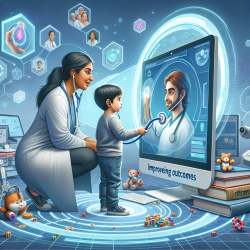As practitioners in the field of special education and mental health, it is crucial to stay updated with the latest research and methodologies to provide the best possible care to our students. One of the emerging areas of interest is the ethical design of online therapy systems. A recent research article titled "Moderated Online Social Therapy: Viewpoint on the Ethics and Design Principles of a Web-Based Therapy System" provides valuable insights that can help practitioners improve their skills and enhance the effectiveness of their online therapy sessions.
The research emphasizes the importance of ethical design in creating online therapy systems that not only engage users but also promote their well-being. Here are some key takeaways from the study that can be implemented in your practice:
- Identify Persuasive Technologies: Understand the persuasive technologies and techniques used in online therapy systems. This involves recognizing features that can influence user behavior positively.
- Assess Effectiveness and Effects: Evaluate both the intended and unintended effects of these technologies. This ensures that the tools you are using are beneficial and not causing any harm.
- Disclose Findings: Share your findings with colleagues and stakeholders. Transparency in the effectiveness of online therapy tools helps in building trust and improving practices.
- Advocate for Ethical Design: If you find any aspect of the technology harmful or ethically questionable, take action or advocate for changes. Ethical considerations should always be a priority in therapy design.
Moreover, the study introduces the concept of eudaimonic well-being, which focuses on the holistic development of an individual. This involves fostering autonomy, personal growth, positive relationships, environmental mastery, purpose in life, and self-acceptance. By integrating these principles into your online therapy sessions, you can help students achieve a more fulfilling and well-rounded life.
One practical application is the use of moderated online social therapy (MOST) platforms, which combine social networking with therapeutic interventions. These platforms offer various features such as:
- Steps and Actions: Therapy modules that help in developing psychological skills and core components of well-being.
- Talk It Out (TIO): A space for users to discuss problems and brainstorm solutions collaboratively.
- Team Up: A feature that encourages users to set and achieve personal goals with the support of peers.
By leveraging these tools, practitioners can create a supportive and engaging online environment that promotes mental health and well-being. Encouraging students to participate in these activities not only enhances their therapy experience but also helps them build valuable life skills.
To read the original research paper, please follow this link: Moderated Online Social Therapy: Viewpoint on the Ethics and Design Principles of a Web-Based Therapy System.
Stay informed, stay ethical, and continue to make a positive impact in the lives of your students.










